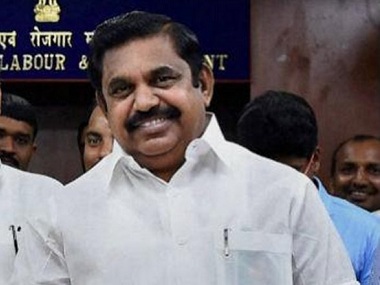The TTV Dhinakaran camp is apprehensive that Tamil Nadu Assembly Speaker P Dhanapal may disqualify its 19 legislators before Edappadi Palaniswami faces a trust vote. The fear also is that he would do it in such a way that there would hardly be any time to move court against such a decision. If Dhanapal does so, it would reduce the strength of the House, enabling the chief minister to prove his majority in an Assembly where he clearly is in a minority. The Madras High court has said no trust vote can take place before 20 September, which in effect gives the Speaker one week to make up his mind. The people of Tamil Nadu can only feel sorry for themselves, given the farce they are being subjected to. The trust vote in February was won on the back of keeping 122 legislators locked for a week at the Koovathur resort, with allegations of bribery doing the rounds subsequently. Now, another trust vote may be won through arithmetical jugglery. That is if Dhanapal plays along. [caption id=“attachment_4046091” align=“alignleft” width=“380”] File image of E Palaniswami. PTI[/caption] Ironically, for all the enthusiasm displayed by the EPS camp in seeking to disqualify the 19 lawmakers in Dhinakaran’s camp, it treated O Panneerselvam and his rump group of 12 legislators with kid gloves, even though it did not vote for the government in the 18 February trust vote. These are the different strokes for different sets of MLAs which are doing the ruling party no credit in ‘Turmoil Nadu’. The question is how will the Speaker interpret the anti-defection law. Would Dhanapal consider the act by the 19 MLAs in giving a letter to the governor that they do not have any faith in Palaniswami’s leadership as amounting to leaving the AIADMK? Or will he do that only if they vote against the government on the floor of the House? Given that the Dhinakaran camp has maintained that it is essentially opposed to Palaniswami’s continuance as chief minister and that does not translate into an anti-AIADMK position, would anti-EPSism translate into a defiance against the party? These are difficult questions and Dhanapal’s decision, apart from being subject to legal scrutiny, would also serve as a precedent in India’s dissonant parliamentary culture. Because if Dhanapal were to look at his counterparts in Assemblies in neighbouring states in south India, he would find that they have not exactly covered themselves with glory. In October 2010, the then Karnataka Assembly Speaker KG Bopaiah disqualified 16 rebel MLAs, including 11 from the BJP, just hours before the trust vote. He also barred them from entering the Assembly and participating in the trial of strength. This effectively brought down the strength of the 224-member House, enabling the then chief minister BS Yeddyurappa to win the vote. However, the Supreme court in May 2011 set aside his decision, observing that it did not meet the “twin tests of natural justice and fair play”. In fact, what is happening in Chennai is a repeat of what happened in Bengaluru. There too, the BJP legislators had said they continued to be BJP members and would support any BJP government headed by anyone but Yeddyurappa. In Tamil Nadu too, the Dhinakaran group wants to see EPS out as chief minister and replaced by any other mutually acceptable leader, preferably Dhanapal, who is a senior Dalit leader. Look at Telangana where on display is a brazen refusal to apply the anti-defection law. Since 2014, when the state came into existence and the new Assembly was formed, 12 of the 15 Telugu Desam legislators have crossed over, one by one, to the ruling Telangana Rashtra Samiti. Since they did not cross over as a group, they cannot be seen as causing a split in the TDP legislature party and ideally would attract the provisions of the anti-defection law. The early bird among the defectors, Srinivas Yadav, is also a minister in the cabinet. However, Speaker Madhusudhana Chary has sat on petitions to disqualify them. Nor have the MLAs resigned and sought to go to the people to seek a fresh mandate under the TRS umbrella. The ruling party, without batting an eyelid, calls the poaching “political realignment”. Despite being the aggrieved party in Telangana, in his own state of Andhra Pradesh, Chandrababu Naidu has borrowed the TRS template. He encouraged 21 YSR Congress legislators to cross over and made four of them ministers early this year. Again, Andhra Pradesh Assembly Speaker Kodela Sivaprasad Rao has done precious little about the petitions. Both the Telangana and the Andhra Pradesh cases are before the Hyderabad High Court and if the verdict is to come only by 2019, when the term of the Assembly ends, it would serve no purpose. When the anti-defection law was brought in by the Rajiv Gandhi government in the mid-1980s, one of the criticisms was that it would kill inner party democracy and that the party in power would be able to manipulate it. While inner party democracy has manifested itself in elected representatives opting for the side where the grass is green, the Karnataka, Telangana and Andhra instances are clear examples of an unholy violation of the law. It is time to take another look at the institution of the Speaker of the House, laying clear guidelines on how the Chair should conduct himself. The anti-defection law should either be uniformly applied or scrapped.
The TTV Dhinakaran camp is apprehensive that Tamil Nadu Assembly Speaker P Dhanapal may disqualify its legislators before Palaniswami faces a trust vote.
Advertisement
End of Article


)
)
)
)
)
)
)
)
)



